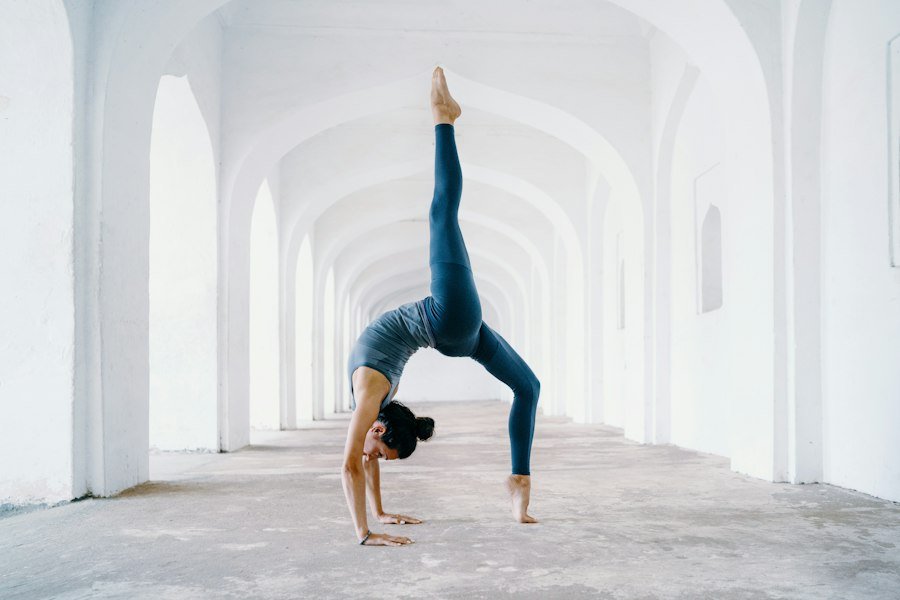Learning gym vocabulary in Chinese is important for anyone who wants to effectively communicate and navigate their way through a gym in a Chinese-speaking country or with Chinese-speaking individuals. Whether you are a beginner or an advanced gym-goer, having a good understanding of gym vocabulary will help you feel more confident and comfortable in the gym environment.
There are various types of gym vocabulary that you should familiarize yourself with. This includes basic gym equipment, common exercises, weightlifting and strength training terms, cardiovascular exercise terms, stretching and flexibility terms, gym etiquette and safety terms, fitness class terms, tracking progress and setting goals terms, and useful phrases for communicating with gym staff.
Table of Contents
ToggleKey Takeaways
- Chinese gym vocabulary includes terms for equipment, exercises, and etiquette
- Basic gym equipment in Chinese includes treadmill, dumbbell, and barbell
- Common exercises in Chinese include push-ups, squats, and lunges
- Vocabulary for weightlifting and strength training in Chinese includes reps, sets, and max weight
- Cardiovascular exercise vocabulary in Chinese includes running, cycling, and swimming
Basic gym equipment in Chinese
To start off, let’s look at some basic gym equipment vocabulary in Chinese. This includes words for common gym equipment such as treadmills, weights, and resistance bands. Knowing these words will help you navigate the gym and understand how to use the equipment properly.
Some common gym equipment vocabulary in Chinese includes:
– Treadmill: 跑步机 (pǎobù jī)
– Weights: 杠铃 (gānglíng)
– Resistance bands: 弹力带 (tánlì dài)
– Dumbbells: 哑铃 (yǎlíng)
– Bench press: 卧推 (wò tuī)
If you need help using any of the equipment, you can ask for assistance by saying “请问,我可以请你帮我使用这个吗?” (Qǐngwèn, wǒ kěyǐ qǐng nǐ bāng wǒ shǐyòng zhège ma?), which means “Excuse me, can you help me use this?”
Common exercises in Chinese
Next, let’s explore some vocabulary for common exercises in Chinese. This includes words for exercises such as push-ups, squats, and lunges. Knowing these words will help you understand exercise instructions and communicate with others about your workout routine.
Some common exercise vocabulary in Chinese includes:
– Push-ups: 俯卧撑 (fǔwòchēng)
– Squats: 深蹲 (shēndūn)
– Lunges: 弓步 (gōngbù)
– Plank: 平板支撑 (píngbǎn zhīchēng)
– Sit-ups: 仰卧起坐 (yǎngwò qǐzuò)
If you need help with any of the exercises, you can ask for assistance by saying “请问,你可以帮我纠正我的动作吗?” (Qǐngwèn, nǐ kěyǐ bāng wǒ jiūzhèng wǒ de dòngzuò ma?), which means “Excuse me, can you help me correct my form?”
Vocabulary for weightlifting and strength training in Chinese
| Term | Definition |
|---|---|
| Bench press | A weight training exercise in which a person lies flat on their back and lifts a barbell off their chest. |
| Deadlift | A weight training exercise in which a person lifts a loaded barbell off the ground to a standing position. |
| Squat | A weight training exercise in which a person bends their knees and hips to lower their body and then stands back up while holding a barbell on their shoulders. |
| Power clean | A weight training exercise in which a person lifts a barbell from the ground to their shoulders in one fluid motion. |
| Snatch | A weight training exercise in which a person lifts a barbell from the ground to overhead in one fluid motion. |
| Rep | Short for repetition, a single completion of a weight training exercise. |
| Set | A group of repetitions of a weight training exercise. |
| Plate | A circular weight used on barbells and weight machines. |
| Spotter | A person who assists a weightlifter during an exercise to prevent injury. |
Moving on, let’s look at some vocabulary for weightlifting and strength training in Chinese. This includes words for weightlifting equipment such as barbells and dumbbells, as well as vocabulary for different types of weightlifting exercises.
Some weightlifting equipment vocabulary in Chinese includes:
– Barbells: 杠铃 (gānglíng)
– Dumbbells: 哑铃 (yǎlíng)
– Weight plates: 杠铃片 (gānglíng piàn)
– Resistance machines: 器械 (qìxiè)
– Power rack: 力量架 (lìliàng jià)
Some weightlifting exercise vocabulary in Chinese includes:
– Deadlift: 硬拉 (yìnglā)
– Bench press: 卧推 (wò tuī)
– Squat: 深蹲 (shēndūn)
– Shoulder press: 推举 (tuījǔ)
– Bicep curl: 弯举 (wānjǔ)
Cardiovascular exercise vocabulary in Chinese
Now let’s explore some vocabulary for cardiovascular exercises in Chinese. This includes words for different types of cardiovascular exercises such as running and cycling. Knowing these words will help you understand exercise instructions and communicate with others about your cardio routine.
Some cardiovascular exercise vocabulary in Chinese includes:
– Running: 跑步 (pǎobù)
– Cycling: 骑自行车 (qí zìxíngchē)
– Swimming: 游泳 (yóuyǒng)
– Jumping rope: 跳绳 (tiàoshéng)
– Rowing: 划船 (huáchuán)
If you need help with any of the cardiovascular exercises, you can ask for assistance by saying “请问,你可以帮我调整一下这个有氧运动机器吗?” (Qǐngwèn, nǐ kěyǐ bāng wǒ tiáozhěng yīxià zhège yǒuyǎng yùndòng jīqì ma?), which means “Excuse me, can you help me adjust this cardio machine?”
Stretching and flexibility vocabulary in Chinese

Next, let’s explore some vocabulary for stretching and flexibility exercises in Chinese. This includes words for different types of stretching exercises. Knowing these words will help you understand exercise instructions and communicate with others about your stretching routine.
Some stretching and flexibility exercise vocabulary in Chinese includes:
– Stretch: 拉伸 (lāshēn)
– Hamstring stretch: 腿筋拉伸 (tuǐ jīn lāshēn)
– Quadriceps stretch: 股四头肌拉伸 (gǔ sìtóujī lāshēn)
– Shoulder stretch: 肩部拉伸 (jiānbù lāshēn)
– Back stretch: 背部拉伸 (bèibù lāshēn)
If you need help with any of the stretching exercises, you can ask for assistance by saying “请问,你可以帮我做这个伸展运动吗?” (Qǐngwèn, nǐ kěyǐ bāng wǒ zuò zhège shēnzhǎn yùndòng ma?), which means “Excuse me, can you help me with this stretching exercise?”
Gym etiquette and safety vocabulary in Chinese
It is important to be familiar with gym etiquette and safety vocabulary in Chinese to ensure a safe and respectful gym environment. This includes vocabulary for gym rules and safety precautions, as well as how to ask for help in case of an emergency.
Some gym etiquette and safety vocabulary in Chinese includes:
– No cell phones: 禁止使用手机 (jìnzhǐ shǐyòng shǒujī)
– Wipe down equipment after use: 使用后请擦拭设备 (shǐyòng hòu qǐng cāshì shèbèi)
– Use a towel: 使用毛巾 (shǐyòng máojīn)
– Put weights back in their proper place: 将杠铃放回原位 (jiāng gānglíng fàng huí yuánwèi)
– Emergency exit: 紧急出口 (jǐnjí chūkǒu)
If you need help in case of an emergency, you can ask for assistance by saying “请帮帮我,我需要紧急救援!” (Qǐng bāng bāng wǒ, wǒ xūyào jǐnjí jiùyuán!), which means “Please help me, I need emergency assistance!”
Vocabulary for fitness classes in Chinese
If you are interested in taking fitness classes at the gym, it is important to be familiar with vocabulary for different types of fitness classes in Chinese. This includes words for classes such as yoga and Pilates, as well as how to ask for help during fitness classes.
Some fitness class vocabulary in Chinese includes:
– Yoga: 瑜伽 (yújiā)
– Pilates: 普拉提 (pǔlātí)
– Zumba: 尊巴舞 (zūnbā wǔ)
– Spin class: 室内骑行课程 (shìnèi qíxíng kèchéng)
– HIIT class: 高强度间歇训练课程 (gāo qiángdù jiànxiē xùnliàn kèchéng)
If you need help during a fitness class, you can ask for assistance by saying “请问,我可以请你帮我调整我的姿势吗?” (Qǐngwèn, wǒ kěyǐ qǐng nǐ bāng wǒ tiáozhěng wǒ de zīshì ma?), which means “Excuse me, can you help me adjust my posture?”
Tracking progress and setting goals in Chinese
To stay motivated and see progress in your fitness journey, it is important to track your progress and set goals. This includes vocabulary for tracking progress such as weight and body measurements, as well as vocabulary for setting fitness goals in Chinese.
Some tracking progress vocabulary in Chinese includes:
– Weight: 体重 (tǐzhòng)
– Body fat percentage: 体脂肪百分比 (tǐzhīfáng bǎifēnbǐ)
– Muscle mass: 肌肉质量 (jīròu zhìliàng)
– BMI (Body Mass Index): 身体质量指数 (shēntǐ zhìliàng zhǐshù)
– Waist circumference: 腰围 (yāowéi)
Some fitness goal vocabulary in Chinese includes:
– Lose weight: 减肥 (jiǎnféi)
– Build muscle: 增肌 (zēngjī)
– Improve flexibility: 提高柔韧性 (tígāo róurènxìng)
– Increase endurance: 提高耐力 (tígāo nàilì)
– Run a marathon: 跑马拉松 (pǎo mǎlāsōng)
Useful phrases for communicating with gym staff in Chinese
Lastly, let’s explore some useful phrases for communicating with gym staff in Chinese. This includes how to ask for help with gym equipment or exercises, as well as how to make small talk with gym staff.
Some useful phrases for communicating with gym staff in Chinese include:
– Excuse me, can you show me how to use this machine? 请问,你可以教我如何使用这台机器吗? (Qǐngwèn, nǐ kěyǐ jiāo wǒ rúhé shǐyòng zhè tái jīqì ma?)
– Can you spot me while I do this exercise? 你可以在我做这个动作时帮我看着吗? (Nǐ kěyǐ zài wǒ zuò zhège dòngzuò shí bāng wǒ kànzhe ma?)
– How many sets and reps should I do for this exercise? 这个动作我应该做多少组和多少次? (Zhège dòngzuò wǒ yīnggāi zuò duōshǎo zǔ hé duōshǎo cì?)
– What is the proper form for this exercise? 这个动作的正确形式是什么? (Zhège dòngzuò de zhèngquè xíngshì shì shénme?)
– How can I improve my technique for this exercise? 我如何才能提高这个动作的技术? (Wǒ rúhé cáinéng tígāo zhège dòngzuò de jìshù?)
In conclusion, learning gym vocabulary in Chinese is essential for effective communication and navigation in a gym setting. By familiarizing yourself with the different types of gym vocabulary, including basic gym equipment, common exercises, weightlifting and strength training terms, cardiovascular exercise terms, stretching and flexibility terms, gym etiquette and safety terms, fitness class terms, tracking progress and setting goals terms, and useful phrases for communicating with gym staff, you will be able to confidently communicate and understand instructions in the gym. So, don’t hesitate to practice using gym vocabulary in Chinese to improve your communication at the gym.
Contact our head teacher, Chen Huimin, at info@lcchineseschool.com if you want to learn Chinese or have additional questions about our Chinese programs.
Sign up for a free trial class here.
Learn about our Internship Program in China.
Get free Chinese learning resources.
Learn about China’s 2024 Offical Holiday Schedule







